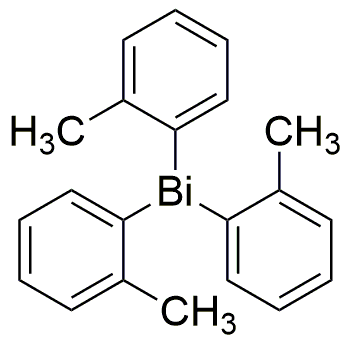Tri-o-tolylbismuthine is widely utilized in research focused on:
- Organic Synthesis: This compound serves as a versatile reagent in organic chemistry, facilitating the synthesis of various organic compounds, particularly in the formation of carbon-carbon bonds.
- Pharmaceutical Development: It plays a role in the development of pharmaceuticals, particularly in the synthesis of bismuth-containing drugs that have applications in treating gastrointestinal disorders.
- Materials Science: Used in the creation of advanced materials, Tri-o-tolylbismuthine contributes to the development of semiconductors and other electronic materials, enhancing their performance and stability.
- Catalysis: This compound acts as a catalyst in several chemical reactions, improving reaction rates and yields, which is particularly beneficial in industrial applications where efficiency is crucial.
- Research in Coordination Chemistry: It is valuable in studies involving coordination compounds, helping researchers understand metal-ligand interactions and develop new coordination complexes with potential applications in various fields.
General Information
Properties
Safety and Regulations
Applications
Tri-o-tolylbismuthine is widely utilized in research focused on:
- Organic Synthesis: This compound serves as a versatile reagent in organic chemistry, facilitating the synthesis of various organic compounds, particularly in the formation of carbon-carbon bonds.
- Pharmaceutical Development: It plays a role in the development of pharmaceuticals, particularly in the synthesis of bismuth-containing drugs that have applications in treating gastrointestinal disorders.
- Materials Science: Used in the creation of advanced materials, Tri-o-tolylbismuthine contributes to the development of semiconductors and other electronic materials, enhancing their performance and stability.
- Catalysis: This compound acts as a catalyst in several chemical reactions, improving reaction rates and yields, which is particularly beneficial in industrial applications where efficiency is crucial.
- Research in Coordination Chemistry: It is valuable in studies involving coordination compounds, helping researchers understand metal-ligand interactions and develop new coordination complexes with potential applications in various fields.
Documents
Safety Data Sheets (SDS)
The SDS provides comprehensive safety information on handling, storage, and disposal of the product.
Product Specification (PS)
The PS provides a comprehensive breakdown of the product’s properties, including chemical composition, physical state, purity, and storage requirements. It also details acceptable quality ranges and the product's intended applications.
Certificates of Analysis (COA)
Search for Certificates of Analysis (COA) by entering the products Lot Number. Lot and Batch Numbers can be found on a product’s label following the words ‘Lot’ or ‘Batch’.
Numéro de catalogue
Numéro de lot/série
Certificates Of Origin (COO)
This COO confirms the country where the product was manufactured, and also details the materials and components used in it and whether it is derived from natural, synthetic, or other specific sources. This certificate may be required for customs, trade, and regulatory compliance.
Numéro de catalogue
Numéro de lot/série
Safety Data Sheets (SDS)
The SDS provides comprehensive safety information on handling, storage, and disposal of the product.
DownloadProduct Specification (PS)
The PS provides a comprehensive breakdown of the product’s properties, including chemical composition, physical state, purity, and storage requirements. It also details acceptable quality ranges and the product's intended applications.
DownloadCertificates of Analysis (COA)
Search for Certificates of Analysis (COA) by entering the products Lot Number. Lot and Batch Numbers can be found on a product’s label following the words ‘Lot’ or ‘Batch’.
Numéro de catalogue
Numéro de lot/série
Certificates Of Origin (COO)
This COO confirms the country where the product was manufactured, and also details the materials and components used in it and whether it is derived from natural, synthetic, or other specific sources. This certificate may be required for customs, trade, and regulatory compliance.


